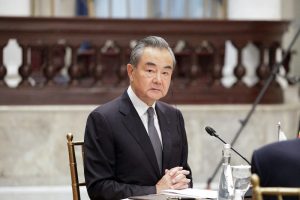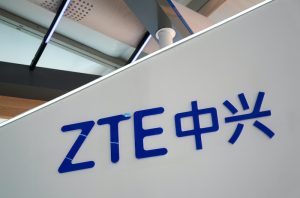Chinese officials have launched an offensive against the US semiconductor industry with multiple probes within days targeting American chip policies, and alleged ‘dumping’ practices.
China’s Ministry of Commerce made the first move on Saturday as it initiated an anti-discrimination investigation, as well as a separate investigation into dumping.
The first investigation will examine whether Washington discriminated against Chinese companies in its policies on trade in chips. The second will look into suspected dumping of imports of some US analog chips used in devices such as hearing aids, Wi-Fi routers and temperature sensors.
Also on AF: China Agrees to Deal on TikTok With US Trade Officials in Spain
On Monday, China’s market regulator also took aim on US chipmaker Nvidia — the world’s most valuable company — saying it had violated the country’s anti-monopoly law.
The announcement followed an investigation launched in December, widely seen as a retaliatory shot against Washington’s curbs on the Chinese chip sector.
The regulator, the State Administration for Market Regulation (SAMR), said it will now conduct further inquiries into Nvidia. It did not elaborate on how Nvidia had violated China’s anti-monopoly laws, and did not specify the nature or scope of further probes into the chipmaker.
The investigations come amid efforts by Chinese and American negotiators to resolve a range of trade issues, with talks in Madrid ending on Monday after a deal was reached on TikTok’s operations in the US.
Chips, including those made by Nvidia, were expected to be on the agenda, but little was said after the deal on TikTok was announced.
They also followed a US decision on Friday to add 32 entities, 23 of them in China, to a commerce department restricted trade list. They included two Chinese firms accused of acquiring US chipmaking equipment for China’s top chipmaker SMIC.
Analysts told Reuters the moves from China — particularly those against Nvidia — were likely timed to give Beijing clout during trade talks. Beijing has in the past also weaponised its dominant position as a supplier of rare earths to the US in retaliation against chip curbs.
“Both sides appear to be building leverage to negotiate from a more favourable position, but they are doing this through very calculated moves because they understand the stakes at play,” Alfredo Montufar-Helu, managing director at strategic advisory firm GreenPoint said.
Nvidia ‘violated commitments’
SAMR said Nvidia was suspected of violating commitments it made during its acquisition of Israeli chip designer Mellanox Technologies, under terms outlined in its 2020 conditional approval of that deal.
One of those terms was that Nvidia would continue to supply the Chinese market with GPU accelerators, used in computing. In recent years, the company has been forced to end sales of its most advanced accelerators due to export controls implemented by the Biden administration.
According to China’s antitrust law, companies can face fines of between 1% and 10% of their annual sales from the previous year. China generated $17 billion in revenue for Nvidia in the fiscal year ending January 26, or 13% of total sales, based on its latest annual report.
Beyond the fine, the impact of SAMR’s decision remains unclear, but Nvidia could be required to sell chips in China unaccompanied by Mellanox’s technology, according to Lian Jye Su, chief analyst at consultancy Omdia.
But Su added that as long as there was no outright ban of Nvidia GPU sales, demand in China would remain.
‘Discrimination and dumping’
Meanwhile, referring to investigations opened on Saturday, China’s commerce ministry said in a statement that the United States had imposed a series of restrictions on China over chips in recent years, including trade discrimination investigations and export controls.
Such “protectionist” practices are suspected of discriminating against China and aimed at suppressing China’s development of high-tech industries such as advanced computing chips and artificial intelligence, it added.
“What is the US’s intention in imposing sanctions on Chinese companies at this time?” the ministry said, referring to US sanctions announced on Friday.
“China urges the US to immediately correct its erroneous practices and cease its unwarranted suppression of Chinese companies. China will take necessary measures to resolutely safeguard the legitimate rights and interests of Chinese companies.”
Meanwhile, industry groups have extended their backing for the probes, Beijing mouthpiece Global Times said on Monday.
One such group — the Jiangsu Semiconductor Industry Association — said the dumping margin of certain simulation chips coming in from the US “had exceeded 300%.” It cited four main producers of those chips: Texas Instruments, Analog Devices (ADI), Broadcom and Onsemi.
As of 2024, those chips held a near 45% share of the Chinese market, the association said.
‘Poor timing’
Zhengyuan Bo, a partner at research company Plenum, said SAMR’s preliminary ruling was likely part of a counterpunch to the Trump administration’s addition of Chinese firms on a US trade blacklist.
“It’s a warning that if the US export control paradigm operates in the same way as in the past several years there will be consequences, and China is willing to inflict damage on US companies,” Bo said.
On Monday, US Treasury Secretary Scott Bessent said “the poor timing” of China’s Nvidia investigation on the day of the trade talks was discussed in Madrid.
Meanwhile, the SAMR announcement could also complicate Nvidia CEO Jensen Huang’s aspirations to overcome US-China tensions to sell modified versions of its advanced chips in the world’s second-largest economy.
Huang has been on a charm offensive in China this year, visiting the country three times to signal the US company’s commitment to the Chinese market, which has in recent years seen its ability to sell its most cutting-edge chips repeatedly restricted by US export controls.
Nvidia’s shares fell 1.2% in early US trading on Monday.
- Reuters, with additional editing and inputs from Vishakha Saxena
Also read:
US Says Hidden Radios Found in Solar Highway Tech From China
Chinese Tech Giants ‘Want Nvidia Chips’ Despite Beijing Pushback
US Ends Chip Waiver For TSMC To Supply Its Chinese Fabs
US ‘Put Trackers in AI Chip Shipments to Catch Diversions to China’
‘Can Destroy China’: Trump Says Beijing Has to Give US Magnets
Nvidia CEO Meets TSMC, in Talks With US on New China Chip
Cadence and Nvidia Dealings in China Drawing Close Scrutiny
US Unveils 100% Tariff on Imported Chips But Key Firms Exempt
Nvidia CEO Says US Export Curbs on AI Chips is ‘Flawed’ Policy
China’s Huawei ‘Hoping Its New AI Chip Can Outpower Nvidia’
China’s Huawei, SMIC ‘to Ramp Up Production’ of Newest AI Chip
Huawei, SMIC Set to Defy US Sanctions With 5nm Chips: FT
Satellite Images Show Huawei’s Expanding Chip Facilities – FT
Nvidia’s Bid To Stop Huawei
China Science Vs US Export Controls























